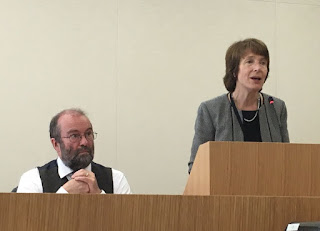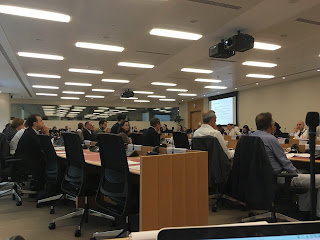The European Medicines Agency is today holding its Tenth stakeholder
forum on the pharmacovigilance legislation of the European Union. This
forum brings together regulators with patients, consumers, healthcare
professionals and industry, to take stock of what the EMA has achieved and what
needs to be the focus over the coming years.
The programme is being broadcast live with presentations thereafter
available on the EMA website.
- a 3-year update on pharmacovigilance activities by Dr Helen
Lee from the European Commission
- a report on SCOPE (The Strengthening Collaboration for Operating
Pharmacovigilance in Europe) by Dr June Raine, head of the EMA's PRAC
(Pharmacovigilance Risk Assessment Committee)
- the Impact of pharmacovigilance by Almath Spooner from the Health
Products Regulatory Authority, Ireland
- the PROTECT health project involving active information-sharing by
patients
- the WEB-RADR project on harnessing mobile apps and geo-tagging
from Philip Tregunno from the UK MHRA - using social media as a signal
detection and strengthening tool
- actions from the EMA Risk Minimisation Measures Topic Group
from Jamie Wilkinson, PGEU (Pharmaceutical Group of the European Union)
The EACPT – the European Assocation for Clinical Pharmacology and
Therapeutics – has 34 member countries in the EU region and beyond, and around
800 individual members. Considering some of the recent pharmacovigilance
activities important for an organisation such as the EACPT, these include:
– the 2013 black triangle scheme which
concerns an evolving list of medicines under additional monitoring, building on
UK experience of this approach to pharmacovigilance. Many EACPT members are
directly or indirectly involved in reporting and monitoring issues related to
safety of medicines
– The EMA-ADR database of ~6 million
reports - a growing resource for recording and assessing risk from medicines
– Robust systems regarding the supply
chain are vital to ensure safe medicines including from internet pharmacies.
Falsified/contaminated/counterfeit medicines must be excluded both in
established and newer members of the EU. This will be one of the– key themes at
the next EACPT Congress in Prague in June in 2017.
Important drivers for change over the next five years include
- transparency and impact of EMA pharmacovigilance activities
- enabling partnerships, including through active EMA working
parties involving healthcare professionals, patients and consumers
- Digital Media to complement current safety systems for evaluating
medicines
Enhanced systems are needed for evaluating Real World health data
across the EU region, for example analogous to the US Sentinel model – an HMO
partnership with FDA and Harvard, and large Clinical Practice databases in the
UK.
These Real World health data resources are needed to support
evaluating signals from social media to complement existing systems for
identifying and preventing adverse drug reactions, as well as to support
development of medicines for patients with rare diseases.
Effective expanding use of social media will to enhance
communications on PV from the EMA to its partner organisations: and through
them tp health professionals, patients and other stakeholders. Systematic
heterogenous use of social media provides great opportunities to enhance
efficiency of effective delivery and monitoring adoption of safety messages –
some of which were aired at the EMA earlier this week – presentations from the
day will be on the EMA website.


